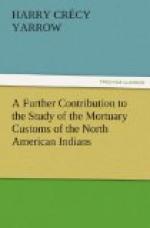To the mind of a savage man unimpressed with the idea that self-murder is forbidden by law or custom, there can seem no reason why, if he so wills, he should not follow his beloved chief, master, or friend to the “happy other world;” and when this is remembered we need not feel astonished as we read of accounts in which scores of self immolations are related. It is quite likely that among our own people similar customs might be followed did not the law and society frown down such proceedings. In fact the daily prints occasionally inform us, notwithstanding the restraints mentioned, that sacrifices do take place on the occasion of the death of a beloved one.
FEASTS.
In Beltrami[96] an account is given of the funeral ceremonies of one of the tribes of the west, including a description of the feast which took place before the body was consigned to its final resting-place:
I was a spectator of the funeral ceremony performed in honor of the manes of Cloudy Weather’s son-in-law, whose body had remained with the Sioux, and was suspected to have furnished one of their repasts. What appeared not a little singular and indeed ludicrous in this funeral comedy was the contrast exhibited by the terrific lamentations and yells of one part of the company while the others were singing and dancing with all their might.
At another funeral ceremony for a member of the Grand Medicine, and at which as a man of another world I was permitted to attend, the same practice occurred. But at the feast which took place on that occasion an allowance was served up for the deceased out of every article of which it consisted, while others were beating, wounding, and torturing themselves, and letting their blood flow both over the dead man and his provisions, thinking possibly that this was the most palatable seasoning for the latter which they could possibly supply. His wife furnished out an entertainment present for him of all her hair and rags, with which, together with his arms, his provisions, his ornaments, and his mystic medicine bag, he was wrapped up in the skin which had been his last covering when alive. He was then tied round with the bark of some particular trees which they use for making cords, and bonds of a very firm texture and hold (the only ones indeed which they have), and instead of being buried in the earth was hung up to a large oak. The reason of this was that, as his favorite Manitou was the eagle, his spirit would be enabled more easily from such a situation to fly with him to Paradise.
Hind[97] mentions an account of a burial feast by De Brebeuf which occurred among the Hurons of New York:




